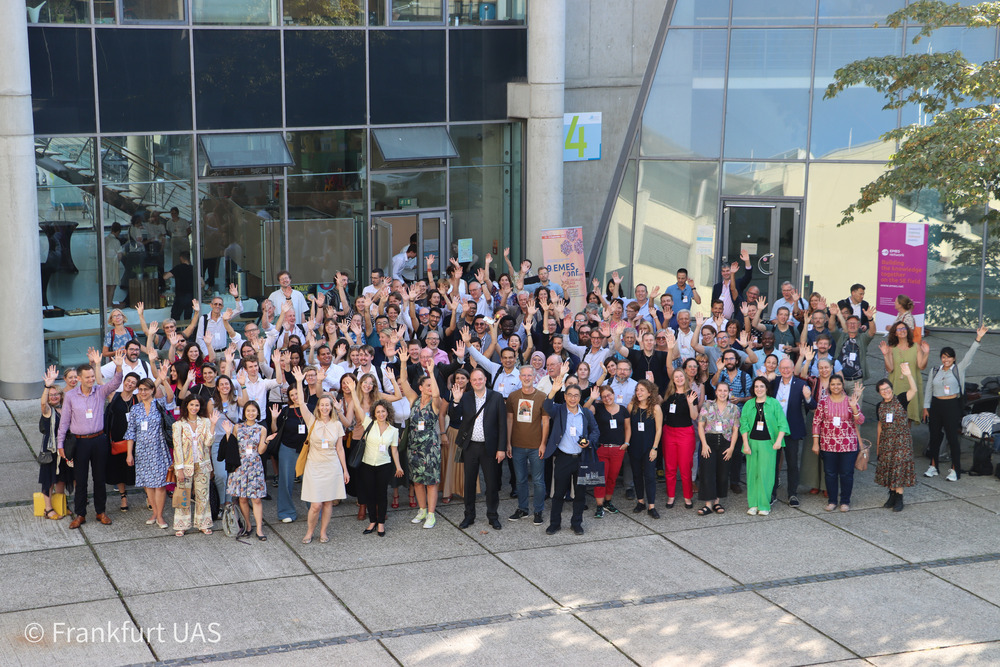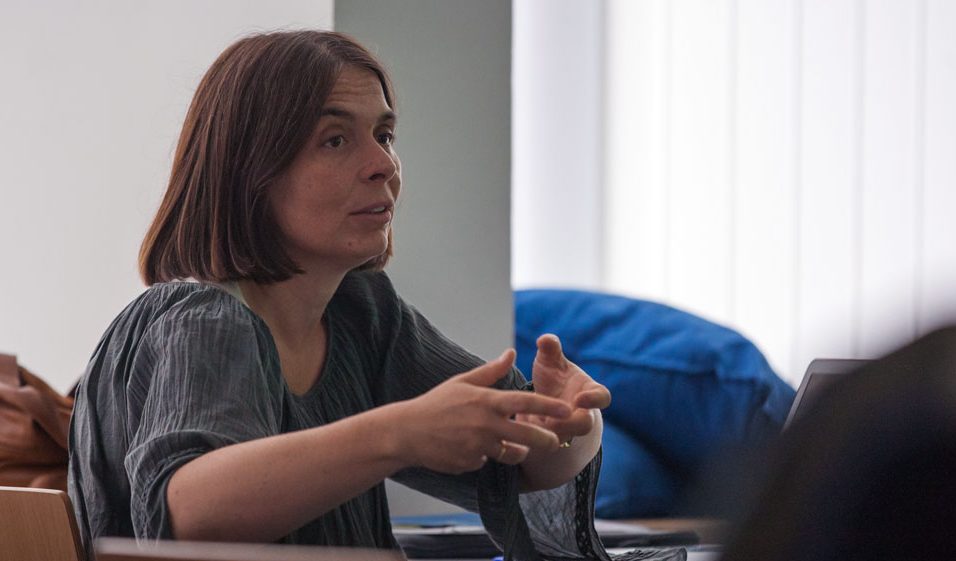At the 2023 annual General Assembly, held at the 9th EMES Conference in Frankfurt, it was announced that Francesca Petrella is a candidate for the presidency of the EMES International Research Network. During its first meeting in November, the new Board announced that Francesca Petrella is the new president of the network!
Before her, our long-standing member, Taco Brandsen, served on the EMES Board as president for two years, following Marthe Nyssens. He helped lead EMES and brought a new perspective on sustainability, research projects and network governance. We are grateful to Taco for his insight, ideas, dedication and advocacy.
Francesca Petrella has been an institutional representative of the Institute of Labour Economics and Industrial Sociology (LEST-CNRS), France, since 2015. She is a professor at the Aix-Marseille University and a researcher in economics at the LEST-CNRS, and co-responsible for the second year of the Master’s Degree specialised in the management of third-sector organisations. She has developed research on social economy organisations, their evolution and interactions with public policies, social innovation, quality of work in social economy and new forms of governance of social welfare services.
She participated in different European research programmes, such as the TSI project (a European research project aimed at identifying the scope and size of the third sector in Europe and measuring its impact on society) and as a member of the French team of the ICSEM Project. She also realised the French report on Social enterprises and their ecosystem with Nadine Richez-Battesti. Francesca also hosted the 6th EMES International Training School in Marseille in 2018 on behalf of the LEST and Aix-Marseille University.
We asked Francesca to share some thoughts with our members on the network’s main challenges and priorities during her mandate.
How did you get to know EMES, and how do you see the evolution of the network over two decades?
I have been involved in the network for a very long time, as I was part of Marthe Nyssens’s research team at the CERISIS at UCLouvain (now CIRTES) in 1995. I have heard about EMES since its “prehistory”. I then completed my PhD with Marthe Nyssens as advisor and Jacques Defourny as part of the PhD jury in 2003. I also participated in the European childcare services project coordinated by EMES in 2001. Therefore, my research interests and my scientific trajectory have been, from the beginning of my career, in strong connection with EMES. I owe a lot to EMES, and becoming president is a way of giving back in a logic of reciprocity.
Over two decades, the EMES network has enlarged from a European network to an international one. It is a major evolution as it has increased diversity in research on social economy and social enterprises and has enlarged the community of researchers. During these two decades, this community has been reinforced, more visible and included a very active PhD and ECR (Early Career Researchers) community.
You are a member of the Board of Directors (second term) and have now been elected president. Can you tell us on the network’s main challenges and the main priorities during your mandate?
First and foremost, I would like to thank the new board for their trust. It’s an honor for me to follow in the footsteps of past presidents Jacques Defourny, Lars Hulgård, Marthe Nyssens and Taco Brandsen, and I hope to be up to the challenge.
To me, the main challenges are the following, in line with what has already been accomplished by EMES. First, to continue to produce, develop, and enhance the quality of research on social enterprise, social economy, and social innovation in a very open, pluralistic, and interdisciplinary way. As mentioned, the research community is enlarging, and it is a challenge now to continuously increase the quality and visibility of our research. In connection with this priority, it is crucial to keep promoting different methodologies and epistemologies (including the multiple North and South epistemologies) to encourage diversity, controversies and critical thinking within the research community to fight against uniformisation and standardisation of the research.
Second, tackling current societal challenges and contributing to fostering just transitions and demonstrating, through our research assets and accumulated knowledge, how social enterprise models can offer innovative and sustainable solutions and be true drivers towards transition. Involving practitioners in research programs has always been part of EMES practices. However, given current challenges, it has become more crucial to involve them in building knowledge together to contribute to the transition.
These challenges cannot be addressed without the help of young researchers who will bring creativity and new ideas to build their own desirable future. As a third challenge, it is therefore important to continue to empower the next generation. EMES has created a large PhD and ECR community. It is now time to enhance the collaboration with master’s degrees involved in the network through Erasmus bilateral agreements and blended intensive programs, which gave the possibility to organize common lectures to students from at least three universities.
Last but not least, we need to secure the EMES budget to support our project through membership, joint research projects, and fundraising.
Talking about the future, how do you imagine the EMES in the 20 years from now?
 I hope that in the next 20 years, EMES will keep its DNA and remain a strong community of researchers based on trust and reciprocity, sharing common values associated with producing high-quality and high-social value research. The work of EMES needs to continue to inspire many researchers, practitioners, citizens, and policymakers (even at the EU level) to build organizational models, supporting ecosystems, and public policies as part of transition pathways to a more sustainable society.
I hope that in the next 20 years, EMES will keep its DNA and remain a strong community of researchers based on trust and reciprocity, sharing common values associated with producing high-quality and high-social value research. The work of EMES needs to continue to inspire many researchers, practitioners, citizens, and policymakers (even at the EU level) to build organizational models, supporting ecosystems, and public policies as part of transition pathways to a more sustainable society.
Thank you, Francesca and all EMES members on the Board, and we look forward to working together to advance the mission of EMES!
Are you interested in becoming an EMES member and contributing to the mission of building knowledge in the SE field? For more information, visit here.

